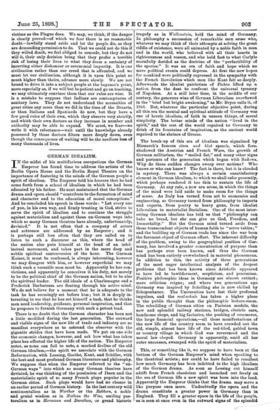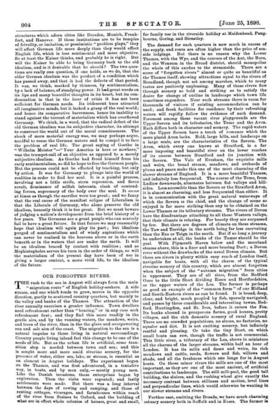GERMAN IDEALISM.
IN the midst of his multifarious occupations the German Emperor has found time to address the artists of the Berlin Opera House and the Berlin Royal Theatre on the importance of fostering in the minds of the German people a spirit of idealism. The Emperor told his hearers that he had come forth from a school of idealism in which he had been educated by his father. He next maintained that the German drama and opera should " contribute to the formation of mind and character and to the education of moral conceptions." And he concluded his speech in these words : "Let every one of you, in his own way, and firmly trusting in God, strive to serve the spirit of idealism and to continue the struggle against materialism and against those un-German ways into which so many German theatres have already, unfortunately, deviated." It is not often that a company of actors and actresses are addressed by an Emperor ; and it is perhaps still less often that they are called on to listen to such a discourse as this, where the head of the nation also puts himself at the bead of an intel- lectual movement, and takes part in the more deep and subtle spiritual controversies of the hour. The German Kaiser, it must be confessed, is always interesting, however we may disagree with him, or however superficial we may think such a versatile man must be. Apparently he has con- victions, and apparently he conceives it his duty, not merely to be the political chief of the German nation, but to be also the spiritual leader. The old ideals of a Charlemagne and a Frederick Barbarossa are floating through his active mind. We do not believe for a moment that he is adequate to the task he has seemingly set before him ; but it is deeply in- teresting to see that he has set himself a task, that he thinks men need leadership, guidance, personal inspiration, and that he proposes to furnish Germany with such a potent lead.
There is no doubt that the German character has been not a little modified during the last generation. The outward and visible signs of the new life of trade and industry are so manifest everywhere as to astound the observer with the gigantic strides that have been made. We put on one side the economic changes, however, and ask how what has taken place has affected the higher life of the nation. The Emperor notes, as none can fail to note, a marked decline of the old German idealism,—the spirit we associate with the German Reformation, with Lasing, Goethe, Kant, and Schiller, with the best and most profound German literature and philosophy. We suppose that when the Emperor referred to the " un- German ways " into which so many German theatres have deviated, he was thinking of the pessimism of Ibsen and the materialistic spirit of so many French plays popular in the German cities. Such plays would have had no chance in an earlier period of German history. In the last century wild sentimentalism as in Werther or the Robbers, a noble and genial wisdom as in Nathan the Wise, smiling pas- toralism as in Hermann and Dorothea, or grand historic tragedy as in Wailenstein, held the mind of Germany. In philosophy a succession of remarkable men arose who, whatever we may think of their attempts at solving the great riddle of existence, were all animated by a noble faith in man and in the world, who believed with all their hearts in righteousness and reason, and who held fast to what Carlyle scornfully derided as the doctrine of the "perfectibility of the species." It was an era of faith and hope which no mere political events could depress. At first the new hopes for mankind were politically expressed in the sympathy with the French Revolution which men like Kant felt so deeply. Afterwards the idealist patriotism of Fichte lifted up a. nation from the dust to confront the universal tyranny of Napoleon. At a still later time, in the middle of our century, the generous wine of German Liberalism overflowed in the " brief but bright awakening," as Mr. Bryce calls it, of 1818. But, whatever the particular objective point, during all this era the mental and spiritual attitude of Germany was one of heroic idealism, of faith in unseen things, of moral simplicity. The better minds of the nation " lived in the spirit," and the rest of the world repaired to Germany to drink of its fountains of inspiration, as the ancient world repaired to the shrines of Greece.
The break-up of this era of idealism was signalised by Bismarck's famous eisen and blut speech, which fore- shadowed the Austrian and French Wars, the growth of German militarism, the " mailed fist," and many other signs and portents of the generation which began with Sadowa. Why do these sudden changes sweep over nations ? Who knows or who can know F The fact is there, but it is clouded in mystery. There was always a certain unsatisfactory element in German idealism, to which we shall refer presently, which perhaps rendered it too thin to sustain the life of Germany. At any rate, a new era arose, in which the things of the mind were laid aside to make room for the things of sense. As Italy has turned from art to economics and engineering, so Germany turned from philosophy to imports and exports, from poetry to heavy guns, from idealist Liberalism to materialist Socialism. One of the most inter- esting German idealists has told us that " philosophy can bake no bread, but she can give us God, Freedom, and Immortality." But the German mind turned aside from these transcendent objects of human faith to " serve tables ; " and the building up of German trade has since the war been the foremost object of German effort. The inherent difficulty of the problem, owing to the geographical position of Ger- many, has involved a greater concentration of purpose than has perhaps ever been known, and thus the German mind has been entirely overwhelmed in material phenomena. In addition to this, the activity of three generations of the most eager intellectual analysis of the deepest problems that has been known since Aristotle appeared to have led to bewilderment, scepticism, and pessimism. Positive philosophic ideas in Germany are almost extinct; mere criticism reigns ; and where two generations ago Germany was inspired by Schelling she is now chilled by Schopenhaner. The Universities have lost their profound impulses, and the real-sehule has taken a higher place in the public thought than the philosophic lecture-room. The rebuilding of German cities on Parisian models, the new and splendid railway stations, bridges, electric cars, handsome shops, and big factories, the pushing of commerce, the large financial operations,—all these manifestations of the new life of the country seem to have crowded out the old, simple, almost bare life of the red-tiled, gabled town or country village in which God was reverenced and the moral law obeyed. Germany is apparently, amid all her outer successes, swamped with the spirit of materialism.
This, or something like it, we suppose to have been at the bottom of the German Emperor's mind when speaking to the theatrical artists; nor could he have failed to recollect how much Germany has been indebted to the high idealism of the German drama. As soon as Lessing cut himself adrift from French classicism and launched out freely on the sea of German life a new spirit was born into the land. Apparently the Emperor thinks that the drama may serve a like purpose once more. Undoubtedly the opera and the drama constitute a greater power in Germany than in England. They fill a greater apace in the life of the people, as is seen at once even in the outward signs of the splendid structures which adorn cities like Dresden, Munich, Frank- fort, and Hanover. If these institutions are to be temples of frivolity, or imitation, or pessimistic "problem plays," they will affect German life more deeply than they would affect English life, which is less sentimental and more objective. So at least the Kaiser thinks, and probably he is right. But will the Kaiser be able to bring Germany back to the old idealism, and is it desirable that he should ? The two ques- tions are really one question, if one holds, as we do, that the older German idealism was the product of a condition which has passed away, and that it had the defects of that period. It was, we think, marked by thinness, by sentimentalism, by a lack of balance, of steadying power. It had great words on its lips and many beautiful thoughts in its heart, but its con- demnation is that in the hour of crisis it has not been sufficient for German needs. Its iridescent hues attracted all imaginative minds, but it lacked a grasp of the real world; and hence its comparative barrenness, hence its inability to stand against the torrent of materialism which has overflowed Germany. We think, in a word, that the radical defect of the old German idealism was its subjective character, its attempt to construct the world out of the moral consciousness. The shock of mere material energy was, we may perhaps argue, needful to rouse the German nature and to compel it to face the problem of real life. The great saying of Goethe in " Wilhelm Meister "—" Your America is here or nowhere," was the trumpet-call of an objective as opposed to a merely subjective idealism. As Goethe had freed himself from his early sentimentalism, so did he hope to free the German people. But the process could not be effected by teaching, but only by action. It was for Germany to plunge into the world of realities in order to find her soul. It is a painful process, involving not a little strife, stern repression, and fierce revolt, dominance of selfish interests, clash of contend- ing forces, supremacy of the body over the soul. It seems at times as though the sacrifice were too great ; and we fancy is in communication with the great natural waterways of
that the real cause of the manifest eclipse of Liberalism is that the Liberals of Germany, who alone preserve the old idealism, honestly think it is too great. But we must beware
of judging a nation's development from the brief history of a few years. The Germans are a great people who can scarcely fail to have a great future. In that future we may reasonably hope that idealism will again play its part ; but idealism purged of sentimentalism and of windy aspirations which can never be realised in the heavens above or in the earth beneath or in the waters that are under the earth. It will be an idealism braced by contact with realities ; and as Mephistopheles serves his turn in the order of things, so will the materialism of the present day have been of use in giving a larger content, a more vivid life, to the idealism of the future.



















































 Previous page
Previous page